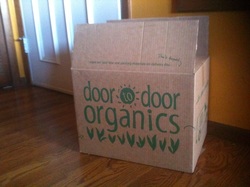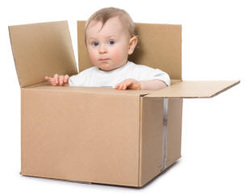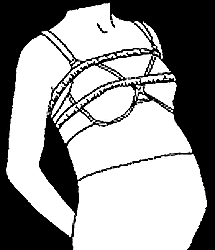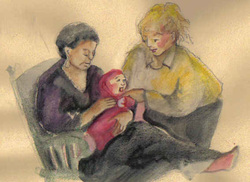 On occasion, I receive correspondence from various people asking me how I know what I know about birth and motherhood, since I have no children of my own. They want to know where I trained and what sort of "hidden agenda(s)" I might have. I take this as a compliment. There is a lot of varied information out there about childbirth, motherhood, fashion, and nutrition. I'm so thankful I don't have to know everything there is to know about those things. I don't know everything there is to know about childbirth and motherhood! And if you've ever met me, you know I'm hopelessly fashionless. My credentials are outlined on my website, if you want to know what all of the fancy letters mean (squat, in fact). So while you're here, please enjoy the laundry as I air out my closet. I believe: The baby will come out. It's amazing, but true. You will not be pregnant with this baby forever, and you can probably give birth vaginally. If your provider says you can't, and you want to, ask lots of questions and/or get a second opinion. The overwhelming majority of the time, a women grows a baby/babies she can give birth to. It does not make sense that we have lived 3.5 million years on Earth by growing babies too big to birth. It's a tight squeeze, and in very rare cases it is not physically possible. We are lucky to have modern medicine and obstetric care. When problems arise, babies come early, mamas get sick, or accidents happen, we are incredibly fortunate to have access to lifesaving procedures, medications, and information. Doulas are superheros. And worth every penny, even if you love your provider, your spouse and your mother and want everyone in the room when you give birth. What's a doula? How do you choose? How do you hire me as your doula? You are not expected to know everything about birth before you have your baby. And if you do, it's a waste of time. You are not going to turn around and deliver the next baby, you just need to know enough to feel confident in your team. A birth class will tell you what you need to know. The internet is for porn. (That's a line from a musical). The internet is not for birth or mothering advice! There are safe places where you can get good, reputable information, and great places where you can network and commiserate about how long it has been since you peed alone. Dr. Google is not your friend. What to Expect When You're Expecting is not worth your time. This book is about being afraid. Being very afraid. The authors forgot that birth is normal and that everyone walking around was born. I recommend these alternatives. Breastfeeding is normal, natural, and possible (and comes with some hurdles). The hurdles are real and without help, it can feel impossible to move forward. Help exists. Learn about it. Please ask me. Everyone is trying to sell you things, because you're part of a "market." For instance, I would like you to come to my classes. Other people want you to buy things not because you need them, but because they are selling them. This includes me. You don't need prenatal yoga. You don't need a crib skirt. Right? Boobs and a carseat are the only things you actually need before baby comes. If you're pregnant, you're halfway there. You can buy things later, I promise. Motherhood isn't all roses and rainbows. Everyone has a different journey to motherhood, with different baggage. You do actually need Mom & Me yoga to form a community where you can remember that you're doing everything right (even when you do something wrong). There are bad mothers out there, but you're probably not one of them. Everyone tells me, "I'm such a bad mother!" Then they talk about the time they put junior in mismatched socks, or turned their back and he rolled off of the couch, or gave him formula. Everyone makes mistakes, and mistakes do not make you a bad mother. You are beautiful. Yep, you. Even if you're covered in spit up or your ankles are as wide as your hips. Mama lions are amazing and so are you. Rawr. That's my agenda. I reserve the right to amend it at any time. What did I miss?
2 Comments
 First, let me be clear: babies are birthed and pizza is delivered. Now that THAT is out of the way... step into my time machine as I bestow upon you the wonders of grocery delivery. Imagine a weekly (or bi-weekly) box of fresh produce and pantry items that arrives at your doorstep. Imagine that it contains only things you like. Imagine that it costs the same as a trip to the grocery store. Good news for you! My time machine is just a figment of my imagination. The beauty of doorstep groceries is a modern convenience, and it is perfect for new mamas and those on bedrest. Some things are more fun with babies, like bath time and navel gazing. Some things are a little more challenging, like loading up groceries, figuring out who to carry in first (baby or ice cream), and grocery carts (in general). While I'm a HUGE proponent of getting outside of your own house once a day once you're healed, I'm not sure grocery shopping will be the blissful experience it once was. Here are my favorite delivery services: Door to Door Organics (Colorado and a few other states) - Set your "likes" and "dislikes" so you never end up with parsley unless you want to. - Order weekly or bi-weekly and forget about it. - Log on a week before and "customize" your fruit and/or veggie box with items that you need or want; add any pantry items or dairy/meat etc. - Hold, cancel, or change box sizes any time (no fee). - Affordable at $25 for a bitty box and up. - Easy refunds on any damaged or icky produce (this has happened to me only twice in two years). Walgreens - Routine prescriptions are mailed to your home with no additional charge (but you need to set them up at least two weeks in advance). - All sorts of toiletries and other things you might need. - Schedule regular deliveries if you know you'll need shampoo or tissues every so often. - Shopping list feature allows you to bookmark items you buy frequently so you (or your partner) don't have to snoop around the internet for the right shampoo. - Free shipping on most orders and regular discounts via email. Nature Box - A combination of healthy snacks mailed once a month. - After your first box, you can customize and include allergies/preferences. - Just like a road trip, where you want the snacks everyone else brought? In a box. Amazon - Nuts, pasta, toilet paper, birthday gifts... whatever else you could possibly need can probably be ordered via Amazon. - Wish list keeps items you like in an easy place. - Recurring orders will save you a bit, if you have a dried coconut habit like I do. Take your trips out of the house to visit the library, a coffee shop, or the zoo and leave the shopping to the Internet. At 2am. Or whenever you are most shoppy! I don't get any kickbacks from these companies, but I've noticed many mamas who have really appreciated the support of these online and delivery services.  I'm an expert list-maker. If you are the list-making type, you may notice that your pregnancy has pushed you into overdrive. Never made a list in your life? This is a great time to learn how to manage one or two. Everyone is, or will be soon, asking you about where you are registered for baby items. You may have no clue what you really need, and might therefore default to the list the store gives you, what your mom/best friend says, or worse (in my humble opinion)anything you can train your scan gun onto. I've addressed the bare-bones pre-baby list in my Registry List, so you know what I think you need. Before you panic, remember the two things you must have before baby is born are boobs and a carseat. If you're currently pregnant, you're halfway there. But for number three, I recommend a couple of ways to get what you need and not much that you don't. 1. Poll your friends. Not the friends you wish you were like, or the friends who have twice as much disposable income as you do, but the friends you think you might be most like as a parent. Ask them what they use most, enjoy most, wish they had received. 2. Find out why they like it. Maybe you've forgotten that you bought them an infant xylophone in a half-hearted attempt to fulfill a registry request but they remember. The reason might be relevant to you, or it might not. Diapers might be gender specific. Strollers are car, carseat, activity, and region-specific. 3. Ask them what they never use/thought they would use/have extra of. Most of the new mamas I encounter are thrilled to purge anything they aren't using. There are truly only so many swaddling blankets that one baby can use, and some babies might use pacifiers while others never take to them. 4. Forget the big-box registry. I know this is sacrilegious, because you don't have the opportunity to use the scan-gun. But I will bet you that the items your friends recommend will not come exclusively from one or two stores. Do you want to lock your family into shopping at one large retailer? Or would you like a few unique items from local stores? There may be other sites like this, but I've heard great things aboutmyregistry.com. You can register for items found anywhere online, and your friends and family can find the item that suits them best. This list can absolutely be your new BFF. Loving lists? Check out my meal-sharing tip sheet and my A/B Listfor postpartum job delegation. More registry suggestions....  Thanks to Kidsguide UK for the photo. Disclaimer: I have no babies, and I've never registered for baby goodies. I have, however, taught lots of classes with women who have both registered and received/not received things they needed... and I've heard enough to share their wisdom with you. Think Local: If you register with a big box store and have any issues with your gifts, returns, broken items, and more, you are sent through a tireless loop of FAQs, menus, and hold songs. If you register with a smaller store in your home town and get to know the people who work there, they will offer you free advice, work with you for exchanges, and recommend products that you and your baby will actually need and use (rather than issuing you a generic list and a scan-gun). When I ask women what they would have done differently, they all say they wouldn't register with one particular big box store because it was impossible to get what they wanted, return what they didn't, and even have items shipped as expected. Less is More (space, money, time): You might be the kind of family that thinks you'd like a pacifier on every end table, but your baby might not take a pacifier. If you register for fifteen of them at the suggestion of a valued friend and you baby never uses them, that's quite a bit of wasted plastic, time, and gift-wrap. Crib skirts are super cute, but are crib legs really that ugly? Think about what you might actually use in the first few weeks and then head out once baby arrives and buy whatever you're missing. Think Quality (of life, that is): Unless you are tickled to have your mother, sister, mother in law, or BFF move in with you, consider asking your friends to contribute towards hiring a postpartum doula. The $500 you spend is worth all the cheap onesies, receiving blankets, toys, and wipe warmers in the world. Follow your Values: If you recycle your cans and jars and consolidate car trips to save a little wear and tear on the Ol' Mother Earth, consider what you can reuse. Cloth diapering a baby costs several thousand dollars less per year than using disposables. It also doesn't smell nearly as bad and you never have to do a midnight run to the drug store through a snow storm to buy replacements. Cribs and high chairs are more likely to be improved from year to year, but if you have a friend whose child is soon moving out of theirs, you can check model numbers online and confirm that no recalls have been issued for the product. Keep It Simple, Sally: Here is the short list of things you actually need before the baby arrives: 1. Boobs 2. Carseat My guess is that if you're pregnant, you're halfway done. If you're pinching your pennies, get a carseat as soon as you can and get it installed (they don't let you leave the hospital without one). What, you wanted a real list? My basic list is here, free for you to download. Enjoy!  Photo: ABC Maternity Do you get the feeling that everyone wants to talk about your breasts? When it comes to pregnancy and breastfeeding, there are a lot of experts out there who can offer assistance in all areas of breast health. There are also people out there masquerading with credentials that don't indicate much actual knowledge. Here's your breast expert primer: Breastfeeding Specific Folks: CLE: A Certified Lactation Educator is someone who knows quite a bit about normal, healthy breastfeeding and can offer education about how healthy mama and baby can give breastfeeding a go. They also offer training about pumping, going back to work, tandem nursing, and common complaints. A CLE is a great first-line of defense when you're not sure where to go with a question because they agree to a professional code of non-judgement. Think of this person as a personal trainer for breastfeeding. La Leche League Leader: A LLL Leader is a woman who has breastfed at least one baby for 12 months and has significant training and education about supporting other women. While some education is part of the role of a LLLL, the other aspect is support. Breastfeeding can be emotional as questions and concerns arise, particularly as it relates to family support of breastfeeding, questions about breastfeeding in public, and cultural considerations. This is a volunteer position filled by women who have a strong passion for breastfeeding. Think of this person as a life coach for breastfeeding. IBCLC: An Internationally Board Certified Lactation Consultant is someone with two years of academic training and thousands of hours of hands-on experience working with women with breastfeeding problems. Some are employed by hospitals and breast-pump rental centers, and others work as independent contractors. They specialize in difficulties, whether baby was born early, there are medical concerns, multiple babies, infections, or concerns about supply. They know how to support women with medical problems like engorgement, mastitis, hormonal challenges, a history of breast surgeries and even adoptive mothers who want to breastfeed. Think of this person as a physical therapist for breastfeeding. Birth Professionals: RN, LPN, BSN, MSN, NP, PA, MD, DO: These are nurses and doctors with varying levels of medical training. Unfortunately, breastfeeding isn't covered very well in nursing or medical school. Unless you know where your nurse or other practitioner trained, you don't know how much support they may offer for breastfeeding. If you're not sure, always consult an IBCLC as well. Formula companies often offer professional development for these professionals, but because they are selling a product that is not consistent with exclusive breastfeeding, they may not teach techniques that could help preserve or work towards exclusive breastfeeding. CNM: A certified nurse midwife should be a better bet when it comes to breastfeeding information and support, because there are specific courses in CNM school that support healthy breastfeeding. CPM, ASM, BSM, MSM: A direct-entry midwife also has more training when it comes to breastfeeding as all accredited programs for midwifery in the US require breastfeeding training and support. Other Professionals: PPD: Postpartum Doulas are trained in supporting normal breastfeeding as a part of their practice. There are two organizations who offer this credential, and both require significant study of healthy breastfeeding. Bra fitters: Ok, you might laugh, but you're going to need some "support" when it comes to your changing body. While you can simply go to a department store and buy a nursing bra or top, this is one time in your life when it would be very helpful to work with someone. I know if you live in Colorado Springs you can get fitted at Baby Cotton Bottoms and only need two bras to take you from 16 weeks pregnant through nursing! A couple of quality bras (and possibly some nursing pads) can be worth the price when they keep you as comfy as possible.  Postpartum doulas from Birthing From Within My friends call me frugal, and boy are they right. I love a good “double ad day” sale and Craigslist as much as anyone can. So it might surprise you to know that I never take the 6am flight. When planning a trip, I used to be persuaded by price. I cleverly locked in the least expensive flight home for the holidays or the least expensive flight to Hawaii, changing my dates and times until I got right down to the cheapest flight possible. Then, the night before the flight I would go into a cold sweat. Knowing that I had to wake up at 3:00 am to drive to the airport and be there two hours early for my 6:00 am departure, I feared I would sleep through my alarm and have to pay a ticket change fee. My sleep was always full of nightmares ranging from packing to missed flights to peeing my pants on the plane because I didn't have enough time beforehand. Driving to the airport, I was always foggy-minded, frustrated, and usually cold. Security was a mess, too. Three hundred people who, just like me, have rarely seen this side of 7 am trying not to appear stoned or start fights in line when they realize they wore their chain mail undies in their rush out the door. I remember thinking: I would totally pay $50 to skip all of this crap and take a 10 am flight like a regular human. And so I do. Each time I pay a little more for my ticket, I know exactly what I'm getting for that $50: a better night of sleep, a reasonable commute, and companionship of humans rather than zombies in the security line. So what does this have to do with a postpartum doula? Were you thinking I posted on the wrong blog? A postpartum doula can change your early parenthood from a string of six am flights to a string of ten am flights for $50 per night or less. Now you may not know what you would be like if you routinely got up at 3:00 am and had to get to the airport early with other zombies. I can assure you that after my thorough travel experiences, it will not do great things to the condition of your personal hygiene, relationships, or sense of humor. I believe that adjusting to your baby routine has the potential to be a little nuts, too. What Postpartum Doulas Do: Help with Breastfeeding. If the last time you experienced breastfeeding was on the other end of the nipple, you likely have some questions about how to latch, how often to feed, how to sleep, and when to enlist the support of a physician and IBCLC. The postpartum doula is like a breastfeeding tour guide with helpful tips and tricks. Infant Care Tips and Support. A lot changes in the first few weeks of a newborn's life! Skin, poop, hair, clothing, bathing, all of those tidbits you didn't know to ask during your childbirth education class are old hat to a postpartum doula. Light Housekeeping. Not all postpartum doulas will do housework, but many will load and unload the dishwasher or washing machine. They will certainly help you understand how to wash baby's laundry and any pumping supplies or supplemental breastfeeding supplies you use. Mama Support. If mom needs a nap or an extended bath, the postpartum doula can offer to sit with the baby and only rouse you if needed. She can also offer information about normal changes your body is experiencing as hormones do a square dance in your bloodstream. Postpartum mood swings are normal, but postpartum mood disorders are something that can be aided dramatically by the right support from a doula or healthcare provider. She will know when you need a good cry and who to refer you to if things get a little darker. Mary Poppins. Some postpartum doulas will offer additional services, like sibling care, light errand running and meal preparation. If you don't have reliable friends and family in town (or if you'd prefer the help without the "additional help" your mother-in-law can offer) find a postpartum doula who will happily step in. Is it worth the money? You should decide what is right for your family. Consider registering for postpartum support rather than crib skirts and decorative borders. Postpartum doulas offer their services in a variety of formats, from daily services to scheduled weekly services, to on-call for middle of the night meltdowns. The nice thing about postpartum doulas is that you don't need to decide in advance of baby being born, but if it sounds like a good option, I recommend retaining their services in advance so you can have the smoothest flight possible. I offer some postpartum services Interested in a Labor Doula?  When you're forming your baby registry, you are encouraged to add a billion different varieties of pacifiers for different ages, genders, and occasions. Some have convenient snaps and buttons so they don't tumble out of the carseat, and others have favorite characters (cleverly aimed away from baby's view). If you receive any, you're likely to get many opinions on whether or not to use a paci. Like every other parenting decision, you're on your own for this one. You get to decide whether using a pacifier is the right choice for your baby. Here are some things to consider: 1. The American Academy of Pediatrics recommends the use of an artificial nipple (they don't use pacifier in their verbiage) for healthy, full term babies who are 4 weeks old or older. They recommend their use for preventing SIDS, to aid with sleep, and to help with any painful procedure in the ER. 2. Using artificial nipples in the first four weeks of a baby's life (unless medically necessary) can confuse the baby and present some breastfeeding challenges. Human nipples work differently and sometimes after a baby becomes used to an artificial nipple it can be frustrating to go back to a human nipple. 3. If a pacifier is routinely used to pacify a fussy newborn, that baby may not nurse as frequently as it needs to. 4. BPA is not currently prohibited in infant products in the US. Zrecs offers some advice about choosing a paci that is BPA free, if this is important to you. 5. There are many ways to feed an otherwise healthy, full term baby than using an artificial nipple. If you've been informed that bottle feeding is your only option and you'd like to know more about other methods, find an IBCLC who can give you a full spectrum of options for your specific challenge. |
About meI'm one of those people who loves making your life easier (and I believe in you). I am an experienced registered prenatal yoga teacher and a lactation educator. Want more? My monthly newsletter might be for you.
Archives
April 2014
Categories
All
|
 RSS Feed
RSS Feed
